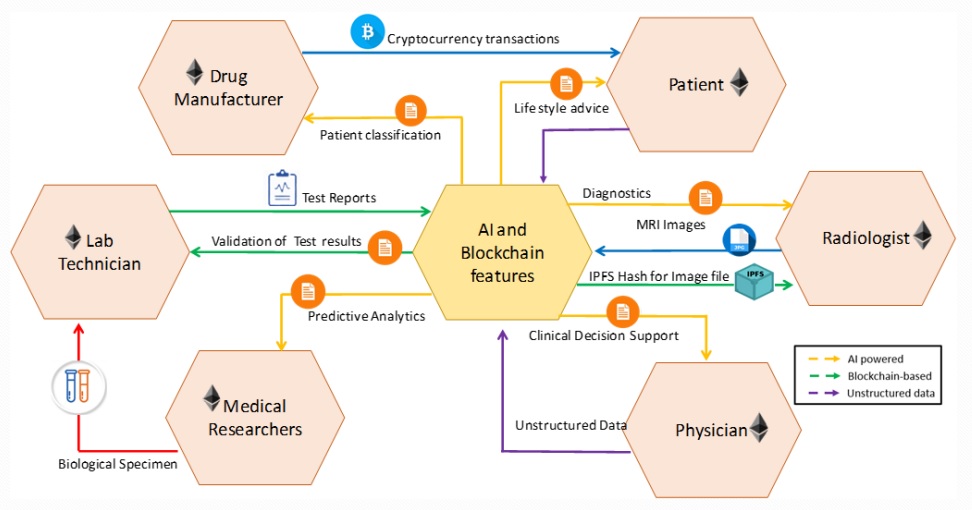Without going into a long discourse, today, we’d like to discuss what opportunities the mix of AI and blockchain could bring to businesses.
For their renowned rich possibilities, both technologies hold great promise for industries worldwide, each one separately. But what would happen when these two meet? Here are our most likely predictions.
Blockchain and AI Meet: Disruptive Use Cases
Accessible Self-learning Algorithms
Currently, AI algorithms require substantial tech contribution and time investments from developers. Only to access training networks, you need authorized access to centralized infrastructure. More, AI- and ML-driven self-learning algorithms require immense CPU resources to run multiple training sessions. Both factors impede and slow down the development of self-learning algorithms.
On the other hand, several startups now look for ways to connect AI developers with mining GPUs running on a blockchain. And when that venture finally finds its realization, AI development will become more available than before. Decentralized mining networks can be accessed from anywhere, while speedy processing times and practically limitless flexibility ensure faster training of algorithms.
A Decentralized Marketplace for AI Algorithms
Already we can witness communities forming around AI and ML development. Engineers gather together to share views, ideas, best practices, and, of course, code. Blockchain inclusion could precipitate that trend to a more advanced stance by establishing a decentralized blockchain marketplace for open-source AI algorithms.
Companies could meet data scientists and buy source codes from them in the marketplace, openly and without intermediaries. Same as before blockchain, developers could make contributions to other projects, this time, receiving donations as rewards, all honest and mutually agreed thanks to blockchain-enabled consensus.
Regaining Control over Personal Data
Well-known companies such as Google, Microsoft, Apple, and others leverage ML-driven algorithms to collect data you readily provide in vast amounts: across signup forms, social pages, online surveys, and other places. Indeed, that helps them better personalize their service, give you more value, and eventually improve your experience. The problem is that you don’t know exactly how your data is used and whom it is shared with, nor can you control it.

Blockchain for AI & AI for Blockchain
Source: Semantic Scholar
Blockchain could give you back that power! A permissioned blockchain framework, like Hyperledger Fabric, could become your true companion in that endeavor, allowing you to share personal data with companies that ask for it, but maintaining control of it all the time. Namely, you would see how the data is handled and define whom it could be shared with, preserving the possibility to revoke provided access at any time.
Think of these opportunities on a broader scale. What about a decentralized data marketplace? The one where you could sell access to data. Eventually, large corporations could pay users to use their data and get new insights. Consider it a passive income that would flow to you as long as your data is worth selling.
Trusted Decision Making
Through self-learning, AI algorithms grow smarter, some even “sapient” over time. Eventually, data scientists may only guess what drives these programs’ decisions since the algorithms access immense amounts of data and “come” to specific conclusions. Then, how to audit those conclusions to make sure they are still data-driven hence rational?
Blockchain provides an immutable record of all the data processed by AI algorithms when making decisions. More, you can observe the entire decision-making process, from accessing data to making conclusions, to make sure there is no faking and trust the choices AI bots make.

Collective Intelligence for Decentralized Healthcare
Source: IEEE Access
More Autonomy for DAOs
For now, blockchain-enabled decentralized autonomous organizations, or DAOs, run by the rules specified in smart contracts. Thus, an organization can take actions, but it’s limited in its decisions, forced to follow strict rules “hardcoded” in smart contracts.
With artificial intelligence, however, organizations could make independent decisions using self-learning algorithms. Those could analyze the current market data and provide relevant recommendations, so organizations could leverage those to make decisions free from outside intervention.
To support the above points (and leave any speculation out of the question), we are concluding the topic with a practical case.
Improving Machine Learning with Blockchain: the Case of Microsoft
A year ago, Microsoft began searching for ways to improve machine learning models running on public blockchains. Despite the developments made so far, there’s so much ground left undiscovered. More, the general public is yet unaware of the benefits machine learning could bring, since the technology remains centralized, existing on proprietary databases. These are the challenges Microsoft tries to solve.
The company is working on the Decentralized & Collaborative AI on blockchain open to the broad community. This way, anyone with the relevant coding skills can train AI models and build data libraries on public blockchains. Among most likely applications are virtual assistants operating on blockchain-enabled proofs-of-concept.
Afterword
Businesses need to understand that blockchain and AI should not operate as replacements of one another, better, they should work in unison. Given that, executives should consider how to upgrade current infrastructure to support that convergence. And the question is more profound than it seems; what kinds of data to collect? Where are the gaps? Answering these questions in advance will help build a reliable foundation of qualitatively new processes in an enterprise.
You may also like:
➔ Enterprise Apps: Major Trends and Predictions
What are the current major trends in the enterprise app industry, and how can they benefit your business? Let’s dive in and find out!





Blockchain Insights
Join our mailing list to receive OpenLedger Insights publications weekly.
Thanks! Please check your inbox to verify your email address.
By clicking “Subscribe”, you’re accepting to receive newsletter emails from OpenLedger Insights every week. You can easily update your email or unsubscribe from our mailing list at any time. You can find more details in our Privacy Policy.